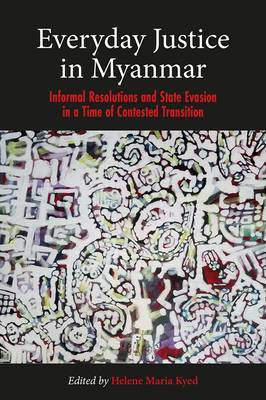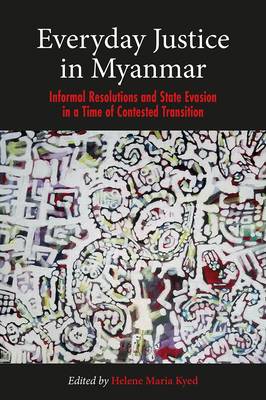
Je cadeautjes zeker op tijd in huis hebben voor de feestdagen? Kom langs in onze winkels en vind het perfecte geschenk!
- Afhalen na 1 uur in een winkel met voorraad
- Gratis thuislevering in België vanaf € 30
- Ruim aanbod met 7 miljoen producten
Je cadeautjes zeker op tijd in huis hebben voor de feestdagen? Kom langs in onze winkels en vind het perfecte geschenk!
- Afhalen na 1 uur in een winkel met voorraad
- Gratis thuislevering in België vanaf € 30
- Ruim aanbod met 7 miljoen producten
Zoeken
Everyday Justice in Myanmar
Informal Resolutions and State Evasion in a Time of Contested Transition
€ 111,95
+ 223 punten
Omschrijving
This volume explores how ordinary people in present-day Myanmar obtain justice and resolve disputes and crimes in a time of contested transition in government, politics, society, and the economy. Its empirical questions serve as a lens to analyze the wider dynamics of state making, the role of identity politics, and the constitution of authority in a country emerging from decades of military rule and civil war. Based on a unique collection of ethnographic studies with ordinary people's experiences to the fore, its contributions illustrate that legal pluralism exists in urban as well as rural contexts: from the cities of Yangon and Mawlamyine to the Naga hills, the Pa-O self-administered zone, the Thai refugee camps, and villages in the Karen and Mon states. In all of these places, the official state system is only one among many avenues for people seeking resolution in criminal and civil cases. Indeed, a common practice is to evade the state whenever possible. Most people prefer local and informal resolutions, and therefore the main actors consulted in everyday justice are village elders, local administrators, religious leaders, spiritual actors, and the justice systems or individual members of ethnic organizations. Prevailing are also a range of alternative understandings of (in)justice, misfortunes, and disputes that differ from those of the state-legal system. These alternatives are based on different cultural norms, religious beliefs, and forms of identification. Despite the ongoing transition in Myanmar, the long history of military rule and conflicts based on ethnic divisions continue to foster a mistrust in the state and an orientation towards 'the local' in everyday justice. The book explores these forms of state evasion and what it means more broadly for state-society relations in the current transition.
Specificaties
Betrokkenen
- Uitgeverij:
Inhoud
- Aantal bladzijden:
- 408
- Taal:
- Engels
- Reeks:
Eigenschappen
- Productcode (EAN):
- 9788776942816
- Verschijningsdatum:
- 30/09/2020
- Uitvoering:
- Hardcover
- Formaat:
- Genaaid
- Afmetingen:
- 152 mm x 231 mm
- Gewicht:
- 635 g

Alleen bij Standaard Boekhandel
+ 223 punten op je klantenkaart van Standaard Boekhandel
Beoordelingen
We publiceren alleen reviews die voldoen aan de voorwaarden voor reviews. Bekijk onze voorwaarden voor reviews.








